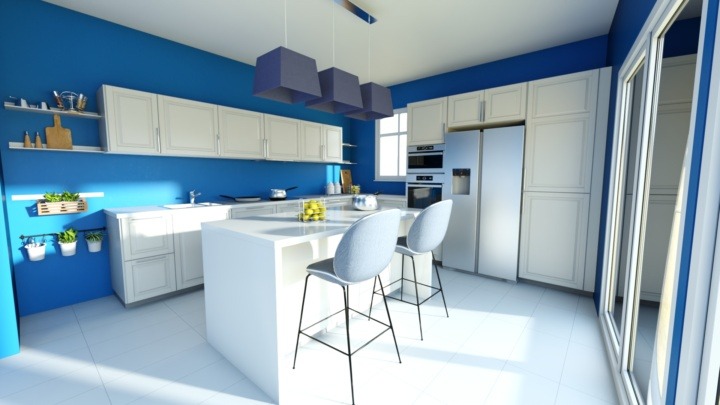Kitchen retailers must keep up with the latest design trends to ensure their digital strategies surpass consumer demand for quality experiences.
2022 is seeing the evolution of the kitchen retail sector.
Digital transformation took on new importance when stores were forced to close. Now, consumers are even more digitally minded. They are more confident purchasing online across a broader range of products and demanding the same quality of experience they have become accustomed to from other categories – like digital banking or subscription services.
In response, kitchen retailers need to ensure their digital strategies continue to meet or go beyond these consumer expectations. For this, they must be up to speed with the latest industry trends and one step ahead of their competition.
Already, we are noticing many major trends that are creating an urgent need for kitchen retailers to adapt their digital strategies and the ways they approach customer acquisition this year. Trends that we noticed, for example, when attending the Hub Day Future of Retail and Ecommerce event in March.
Here are our top three:
1. The power of real-time data and insight
We all know that consumers now expect a personalized buying experience. In fact, 85% of businesses say they already offer personalized experiences. What is interesting, however, is that only 60% of consumers agree they receive them.
When it comes to kitchen retail, it’s becoming increasingly clear that more sophisticated digital strategies are needed to channel data effectively and drive consumer insight. Consumers expect them to use these insights to provide a personalized and differentiated kitchen buying experience.
Integrated website solutions are powerful enablers of the kind of predictive commerce and product personalization that’s required. Using a more sophisticated 3D planning solution, for example, can provide retailers with exclusive insight into the latest design trends, buying habits, and preferences. These are insights that can be used to inform product decisions and personalized marketing communications.
2. Kitchen designs: multifunctional, tech-enhanced, and inspired by the planet
Speaking of design trends, tech isn’t just important to the kitchen purchasing journey. As a result of the increased focus on better hygiene standards following the pandemic, we’re seeing a switch to touch-free technology in kitchen product design.
Concern for the planet and wellbeing has also accelerated, and this growing ‘mindfulness’ is being reflected in how consumers choose to remodel their kitchens – 86% said their kitchen impacts their physical and mental health.
Consumers remodelling their kitchens need to be reassured that the outcome will look and feel good – especially as 31% say they need to upgrade their kitchen but are worried about getting the design wrong.
What’s more, kitchens are becoming multifunctional, formed by the habit of remote working and increased activity within the home. Research shows entertaining, working from home, and exercising are the top activities performed in the kitchen today. With all these new ways that kitchens can be seen and used, kitchen retailers need the digital strategies in place to help consumers plan and visualize their designs with confidence.
3. A successful consumer experience is an omnichannel experience
Globally, shoppers now feel more positive about the online shopping experience (53%) than they do about the brick-and-mortar store experience (18%). What this shows more than anything is the importance of digital strategies to support new buyer journeys both in-store and online. Showrooms need to become smarter and better equipped to match the autonomy of e-commerce, while online platforms need to provide the guidance and reassurance that consumers receive in-store.
Although the uptake of online shopping may have been slower for high-ticket retail purchases before, many kitchen retailers are now seeing the importance of omnichannel strategies, which include autonomous 3D design capabilities – and benefitting from their success.
Case study: How WM88 has transformed consumer experience and slashed delivery times
One example of a kitchen company leading the way in immersive, omnichannel experiences is French furniture manufacturer WM88 and its kitchen brand, Hygena.
As a kitchen brand and retailer, Hygena had identified growing demand for more personalized, online experiences. But e-commerce in the kitchen market is new. Its evolution is only just getting started, and this is partly due to the pandemic. E-commerce has skyrocketed, and at the same time, consumers are ready to spend more redecorating their homes – starting with their kitchens.
However, enabling an online kitchen purchase requires great design functionalities. Designs need to be 100% accurate and account for factors such as water supply, cabinet dimensions, and the locations of utilities. Some software solutions already exist, but they are difficult for consumers to use and require retailers to download and install them.
Easy to implement and easy to use
With HomeByMe for Kitchen Retailers, a cloud-based 3D planning solution, consumers can create their dream kitchens online from the sofa. Prices are displayed in real-time and designs are sales-ready – meaning they are accurate and error-free, thanks to inbuilt design rules that alert users to potential problems. As a result, kitchens designed and purchased online using the solution can move immediately to manufacture, which guarantees fast delivery.
The two-week promise
Now, using the cloud-based HomeByMe for Kitchen Retailers 3D planning solution,
Hygena can fulfil all kitchen orders in just two weeks. That’s compared to the current industry standard of two to three months – and regardless of whether the order is placed online or in-store.
Phygital transformation
Thanks to seamless collaboration with HomeByMe for Retailers, Hygena has transformed the kitchen design experience and introduced a truly omnichannel customer journey. Hygena now offers a fast, phygital experience of a made-to-measure or personalized kitchen – a game-changer in the market.
A revolution: Disrupting the kitchen market
The sophisticated web-based 3D design capabilities of HomeByMe for Kitchen Retailers allow consumers to visualize kitchen designs quickly and easily. Now, they can choose their own optimized path to purchase, whether in-store, online, or a combination of both.
More and more kitchen retailers are undergoing a similar journey to success with their omnichannel offerings. Digital transformation is in full swing in the retail industry, and we’re excited to be a part of it and see what’s next for the future.



